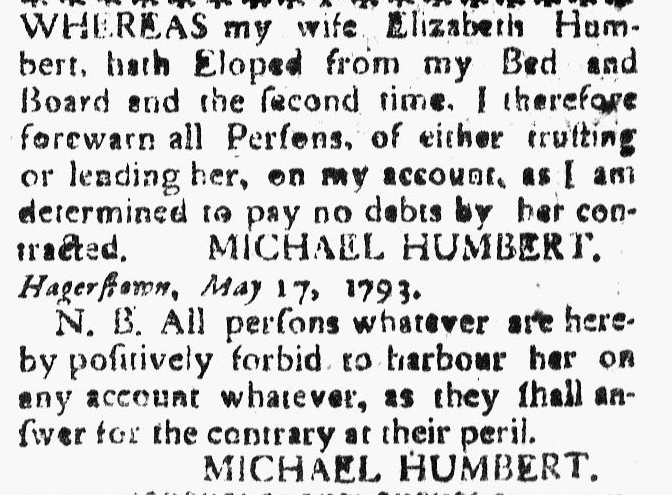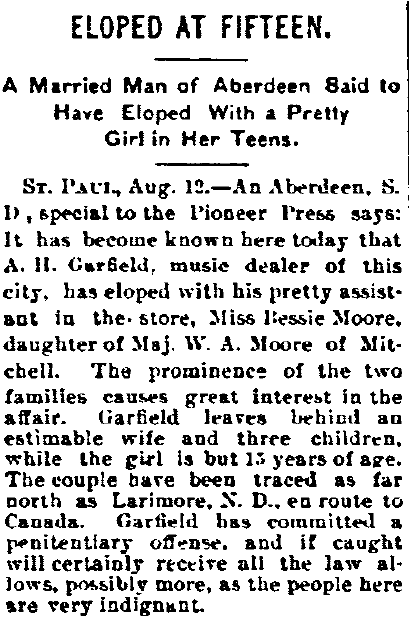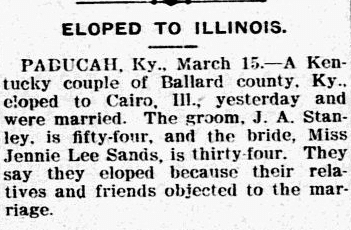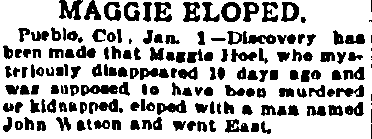Introduction: Gena Philibert-Ortega is a genealogist and author of the book “From the Family Kitchen.” In this guest blog post, Gena searches old newspapers to find stories of our ancestors eloping—and discovers that the word “elope” meant different things at different times.
Anyone who has ever planned a traditional American wedding knows this feeling. As you arrange the wedding, there comes a point after trying on wedding dresses, choosing attendants without making anyone angry, arguing over a manageable guest list, deciding between dried-out chicken meals, and listening to the “good advice” of family and friends, that the thought comes to you:
What if we just eloped?
For some, eloping is a sweet temptation that eventually gets pushed aside in favor of saying “I do” in front of family and friends. For others it’s an idea that makes sense. The cost of a wedding, having been previously married, older brides and grooms, or the stress from trying to negotiate a party that involves close family members who may be divorced and don’t like each other—any of these factors can make anyone want to skip the formalities and go straight to the courthouse or to a Gretna Green.*
So we know why people elope now—but why did our ancestors elope? Well it turns out that in many cases, our ancestors eloped for some of the same reasons people do today. Money, especially during the Great Depression or times of war, made the expense of a traditional wedding impractical. In some cases, the family may have objected to their daughter or son’s intended and so eloping seemed to be the only answer. And of course there may be more nefarious reasons to elope as well, reasons that are all exposed in old newspapers such as GenealogyBank’s online Historical Newspaper Archives.
What Does It Mean to Elope?
If you’re researching your ancestors’ elopement in old newspapers, then one thing to consider is that the meanings of words can change throughout time. For example, the word elope can be traced back to 1338, when it was defined as the act of a wife leaving her husband to run off with her lover. This meaning continued until 1800, when elope came to mean lovers who run away to get married to each other, not to get away from a spouse.** Aside from the meaning of running off with a lover, elope can also mean to slip away or leave.
“Pay No Debts” Ad for Runaway Wife
As we search old newspapers it becomes apparent that our modern idea of eloping, maybe influenced by classic love stories, is different from what eloping meant in older times.
Consider this article from a 1793 Maryland newspaper. It is an advertisement placed by Michael Humbert, who states that his wife Elizabeth has eloped for a second time. He warns against:
all Persons, of either trusting or lending her, on my account, as I am determined to pay no debts by her contracted.

He additionally warns readers:
All persons whatever are hereby positively forbid to harbour her on any account whatever, as they shall answer for the contrary at their peril.
This type of advertisement is similar to ones you might see in 20th century newspapers, in which a person proclaims that they are only responsible for their own debts and not those of other family members. In the case of Michael Humbert’s ad, the word elope most likely means that she has just left him, not necessarily that she went off with a lover—but maybe…
Age Doesn’t Matter in Elopements?
Although eloping is sometimes a romantic notion, other times it might just be criminal. Consider the following story about a married man who runs off with his teenaged coworker. And in case you tend to think that nothing bad happened in the “good old days,” this article is from an 1895 Minnesota newspaper (though I’m sure there are earlier examples).

A music dealer named A. H. Garfield left “an estimable wife and three children” to elope with his “pretty assistant” Bessie Moore, who was only 15. The article concludes:
Garfield has committed a penitentiary offense, and if caught will certainly receive all the law allows, possibly more, as the people here are very indignant.
He’s Not Right for You
Obviously, one reason to elope is that your family doesn’t share your enthusiasm for your beloved. This simple 1905 notice about a Kentucky couple who ran off to Cairo, Illinois, echoes that feeling.

Where Did She Go?
While one of the definitions of the word “eloped” is running away, in today’s world those who elope may simply go to a courthouse or a different location to get married. But in some cases we find in old newspaper articles that those who disappeared were thought of as having possibly eloped with a lover.
In the case reported in this 1901 Rhode Island newspaper, the mystery of where Maggie went was solved, and luckily it was a happier ending than the one her family and friends had imagined: she hadn’t been murdered or kidnapped—she had eloped with John Watson and gone East.

Genealogy Research Tips
Did someone in your family elope? If you are unable to find marriage records in the place your ancestor lived, consider that they may have eloped, either for “romantic” reasons or because of practicalities like finances. Expand your search to include known Gretna Greens or nearby towns. Don’t assume that an ancestor who eloped left no records. Marriage licenses and newspapers published after the fact can help you fill in the story of your ancestor’s married life.
________________
*To learn more about Gretna Greens, see my article “Gin Marriages, Gretna Greens & Your Ancestor’s Marriage Records” on the GenealogyBank Blog.
**Chambers Dictionary of Etymology, by Robert K. Barnhart (Editor). Chambers. (1999).
